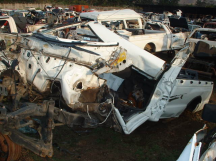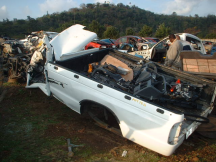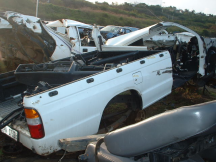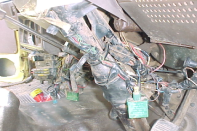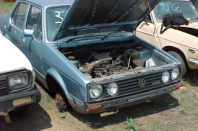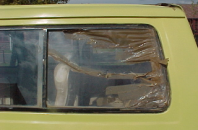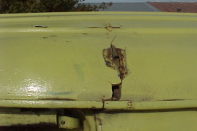|
The Motor Licensing Bureau Continues to Curb Vehicle CrimeWritten by Sue Grobbelaar, Rob Abramson and Sandra van Wyk - Motor Licencing Bureau During 1999 MEC Ndebele ordered the closure of the Umlazi Registration and Licensing Office when it was found that a number of stolen vehicles were illegally introduced onto the National Traffic Information System (NaTIS), at this office. The Motor Licensing Bureau immediately requested the National Department of Transport to appropriately upgrade NaTIS to prevent staff at local Licensing Offices from introducing vehicles onto NaTIS. As a result, since 2000 such introductions can only be performed at the KZN Provincial Help Desk in Pietermaritzburg and only after each case has been fully investigated and found to be legitimate will the Help Desk introduce the vehicle onto NaTIS. This has resulted in a number of stolen vehicles being recovered. However, once the syndicates discovered that they could no longer merely introduce vehicles onto NaTIS, they commenced with applying for duplicate de-registration/registration certificates (logbooks) in the name of the current vehicle owner. The Motor Licensing Bureau (MLB) has in its possession ID documents, which reflects all the owner’s details except that the photograph in the ID is not that of the lawful owner. To combat this, as of 26 August 2002 the Bureau "blocked" the issue of all duplicate de-registration/registration certificates at local Licensing Offices in KZN. All applications for a duplicate logbook now have to be first forwarded to our provincial investigation team for a fully investigation before a duplicate is issued. This investigation can take anything between 7 and 21 days. Vehicle owners are therefore advised to ensure that their logbooks are kept safely. Further, vehicle owners in KZN may only apply for duplicate documents at the appropriate Licensing Office. Example, if a vehicle is registered and licensed in Pongola, an application may only be made in Pongola and the issue of the documents once investigated and verified will only be permitted at Pongola. It is interesting to note that before the Department blocked these transactions, approximately 2000 duplicate documents were issued per week. Currently only about 400 are approved per month. As of 1 July 2003, when the cost of a duplicate de-registration/registration certificate was increased to R500 the number of these applications decreased even further. Since 2002 the number of so-called cloned vehicles in KZN has decreased significantly due to the fact that it has become very difficult or impossible to obtain a duplicate de-registration/registration certificate. It must be understood that the Transport Department can only "block" these cloned vehicles on NaTIS to prevent duplication. This problem can only be finally resolved once a new chassis number is issued by the SAPS and we have been constantly engaged in discussions with the SAPS on this matter.
The above pictures are of a Ford Ranger for which MLB received an application for a duplicate de-registration (scrapping) certificate from the "so-called" owner. And guess what, MLB even received a SAPS clearance for this vehicle. In order to curb this type of vehicle crime, MLB have blocked all Registering Authorities (RA's) from issuing any form of duplicate document in KZN. MLB Head Office will first investigate the application (phone the last known owner as reflected on the NaTIS) and only on confirming the details such as the signature of the owner or confirmation from the insurance company as to why the vehicle was written off or the scrap yard for that matter, will the RA where application was made be permitted to issue the relevant document. This may be a long process, but is worth the effort as in so doing MLB have prevented a large number of stolen vehicles from getting back onto the system and will make every effort to plug the hole as the syndicates find them. Hopefully we are one ahead of these syndicates each time. With this in mind an appeal has been made to other provinces not to issue KZN duplicate documents unless MLB has investigated the application. This takes from 7 to 21 days but at least one knows that we are not assisting the syndicates in their crime. Vehicle testing stations
The Motor Licensing Bureau took over the administrative function of the Vehicle Testing Stations in June 2002. It was established that this industry consisted of 72 Testing Stations comprising of 52 private and 20 public stations. Upon taking over this function the Motor Licensing Bureau embarked upon an intense "clean-up" operation which entailed re-visiting all the files kept on each station; following up on outstanding SABS reports as well as liaising with the SABS on Test Stations. It was discovered that this industry was highly unregulated without even so much as an agreement in place albeit that such entities were in fact deriving an income for a function performed on behalf of government. Through engaging the services of Advocates instructed by the State Attorney’s office, the Motor Licensing Bureau drafted a generic agreement together with a proclamation making the signing of such an agreement a mandatory requirement by the end of December 2003. It must be mentioned that this is in fact a first in the country, and such contract will in fact become a National contract bearing in mind the Road to Safety strategy of the National Department of Transport. In addition to the above and in order to enhance the Road Safety initiatives of the National Department of Transport as well as a Provincial Department of Transport, the Motor Licensing Bureau has successfully closed down the GAP TESTING AND ROADWORTHY CC Test Station in December 2002, the most corrupt Test Station in the Province. The latter was a long and arduous process, which required intense investigations followed by a lengthy litigation process. In this instance as per case no. 1961/02 heard in the Natal Provincial Division of the High Court of South Africa, the Honourable Judge Presiding, Hurt J handed down judgment in favour of the Department on 03/12/2002, wherein he dismissed the application made by the applicants being two motor vehicle examiners and GAP TESTING AND ROADWORTHY CC, with costs. This Department as well as the National Department of Transport view this case as a landmark case in the battle to rid the country of corruption at Vehicle Testing Stations that contribute largely to the carnage on our roads and as well as to curb the endemic proportions of white collar crimes rampant in this industry. To demonstrate the extent of corruption at this very Test Station (GAP TESTING STATION AND ROADWORTHY CC) by the way of example, in about August 2002, a vehicle which was completely unroadworthy, collided with 3 road runners in Pinetown area, two of them being killed and one seriously injured. This particular vehicle obtained a Certificate of Roadworthiness (CRW) from GAP TESTING AND ROADWORTHY CC. Further based on the Motor Licensing Bureau’s successful prosecutions thus far, the National Department of Transport has co-opted officials from the Motor Licensing Bureau to lead a sub-committee of the National Vehicle Technical Committee that is reviewing legislation governing this industry and to recommend improvements / changes to legislation to ensure the proper regulation and control of this industry. The Motor Licensing Bureau has also reviewed the current Code of Practice SABS 0216 and has suggested improvements that are being reviewed by the National Vehicle Technical Committee. To prevent an escalation of this industry in KwaZulu-Natal, the Motor Licensing Bureau has not recommended eight new applications to open Vehicle Testing Stations throughout the Province. In the absence of certain critical criteria for operating a Vehicle Testing Station, the Bureau established such criteria, for example SAPS clearances of the owner, management rep, vehicle examiners, letter from the appropriate municipal council to operate a Vehicle Testing Station etc. The latter was accepted and resulted in the Head of Department not approving eight new applications to open Vehicle Test Stations in the Province. To date the Bureau has successfully closed down 3 vehicle-testing stations. The effects that the improper regulation and control of the Vehicle Test Station industry has on our community are grave and have resulted in innocent passengers and pedestrians risking their lives as a result of motor vehicles being in an unroadworthy condition, society losing its faith in licensing authorities such as the Department and an increase in road accidents as a result of unfit motor vehicles. The stand taken by the Motor Licensing Bureau of Department of Transport since June 2002 as illustrated above no doubt sets it apart from other provinces in terms of the Road to Safety strategy of the KwaZulu-Natal Department of Transport and National Department of Transport. The Motor Licensing Bureau will continue and persevere in its efforts to "cleaning up" this industry bearing in mind, the overriding public interest in the proper regulation and control of the Vehicle Test Station industry. Tare Weight ProjectDue to the fraudulent adjustment of tare weights on the NaTIS, an investigation was held into tare weight fraud, to determine the amount due to the Administration. The NaTIS was amended to reflect the correct tare weights. A meeting was subsequently held with members of the Special Investigation Unit where it was decided that a letter of demand be sent to all owners who had vehicles registered in their names at the time of the tare reductions. Section 5 (2) (c) hearings are currently being held in order to recover the outstanding debt, which will be recovered by means of part payments by the SIU on behalf of the Department Further to the latter, the Provincial Help Desk can only effect the amendment or any change to the tare weight of a motor vehicle, after the Province has detected major corruption in this regard. Investigations revealed that the fraudulent reduction of vehicle tare weights on the system amounted to approximately R3,5 million. The Department after making this discovery embarked on an intense investigation in conjunction with the Special Investigation Unit (SIU) and to date has successfully recovered ± R1,5 million. Curbing Fraud on the NaTISThe Bureau, in conjunction with the other 8 provinces and the National Department of Transport is continually researching ways and means of curbing fraudulent activity increasing security of the NaTIS. In an effort to curb the fraudulent issue of duplicate Registration Certificates and registration of motor vehicles without valid documentation, which has been found to be a major contributing factor to the registration of stolen motor vehicles, the KwaZulu-Natal Department of Transport has taken a decision for such registration certificates to be issued by the Provincial Help Desk. This new process of issue included the blocking of certain transactions at all Registering Authorities except the Provincial Help Desk, who first conduct a thorough investigation of the background and reason for application of a duplicate Registration Certificate. As a result of such investigations, the Department has detected gross anomalies with a number of such applications, where it was detected that applicants had in fact submitted applications under false pretences. Hence the blocking of this transaction or facility has brought to fruition a drastic reduction of applications for duplicate "log books" from approximately 2500 per month to 500 per month. Further, with regard to the blocking of transactions, applications for the registration of motor vehicles without valid documents have reduced from ± 1600 per month to 1000 per month. It must be mentioned that the KwaZulu-Natal Department of Transport was the first province to implement this control measure and owing to its success thus far the other provinces have also implemented this control measure. Furthermore, all motor vehicle introductions if not updated by Manufacturers, Importers or Builders are implemented by the Provincial Help Desk, and again only after lengthy investigations. In order to further safeguard the system, numerous other control measures have been implemented. More significantly, the Department from a Revenue Control perspective and bearing in mind that the province procures approximately R410 million per annum, on vehicle registration and licensing fees from 71 Registering Authorities situated throughout the Province, when Revenue is reconciled, NaTIS financial reports are drawn on a daily basis to verify that all 61 agents bank exactly what was taken in, less their agency fees. The above are merely a few of the initiatives undertaken by the Motor Licensing Bureau to combat fraud and corruption.
|
